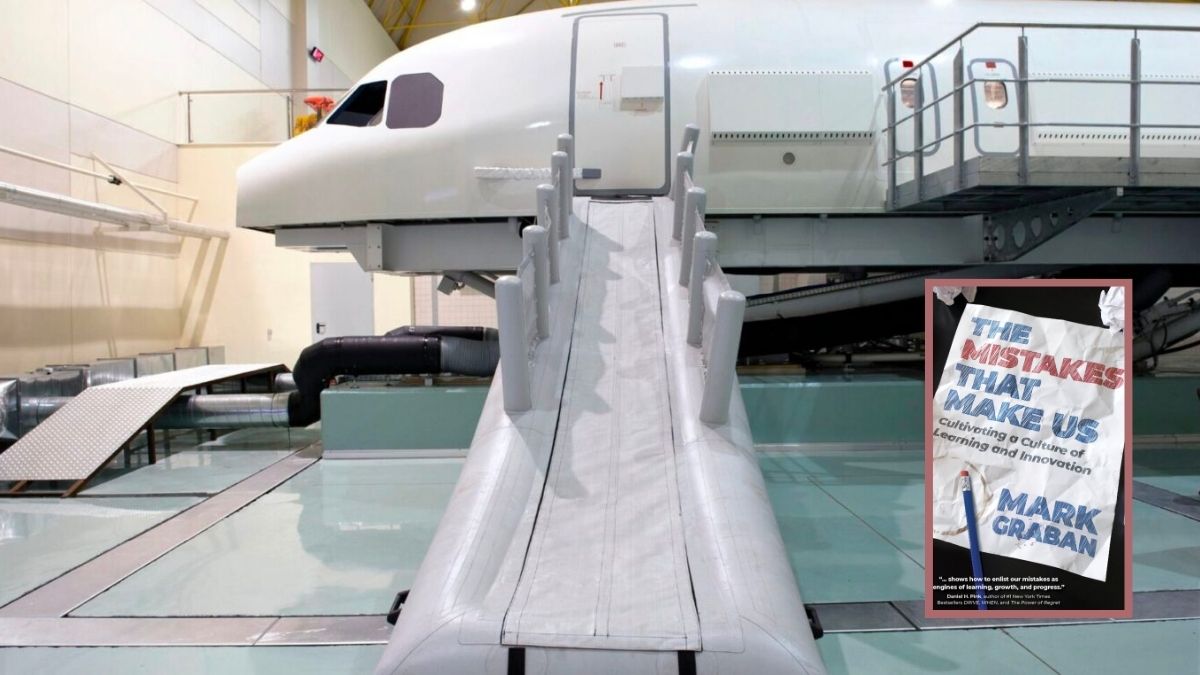It’s not unusual to see individuals get blamed for systemic errors and problems.
Case in point, this article:
It seems like a fact that the flight attendant deployed the slide. But is the mistake their fault?
We can see what happened via this photo on Twitter:
The photo begs the question of why the flight attendant was apparently trying to open the door on the right-hand side of the plane when the jet bridge was on the left. The catering service, one typical use for the right side door, didn’t seem to have been there yet.
Fact:
“Delta confirmed that the emergency slide on the front right-hand side door was accidentally activated during the disarming procedure.”
How could this happen? Surely, it’s not because the flight attendant is dumb or incompetent.
The article explains a systemic flaw in the design of the plane:
“Boeing 767 doors are rather unusual in that they open upwards into the interior of the aircraft. The slide arming mechanism is very close to the door opening handle, which also goes in an upward motion.”
To me, that screams “accident waiting to happen.” And it does happen. A lot. Which is more evidence of this being a design flaw, not a flight attendant flaw.
“This might come as a surprise, but inadvertent slide deployments or ISDs, as they are known in the industry, are a regular everyday event. According to aircraft manufacturer Airbus, there are around three ISDs worldwide every day, and four out of five of those occur on aircraft arrival.”
And that seems to include planes that don’t have that same flaw.
“In the case of the Delta incident on Saturday, it looks like a crew member may have accidentally moved the door handle. A similar incident occurred on a British Airways jet in June and there was another almost identical ISD on a British Airways plane in January.”
The article continues:
“Flight attendants are to blame for around 65% of ISDs, and so-called ‘human factors’ such as fatigue or lack of concentration are often the primary cause of an accidental slide deployment.”
I’m not inclined to agree that “flight attendants are to blame” unless a flight attendant intentionally deployed the slide for some reason, such as being disgruntled. And in an industry where employees are overworked, that might even be a systemic problem too.
Fatigue is a systemic problem that can have roots not just in human fallibility, but also in systemic issues such as working hours and scheduling patterns.
A “lack of concentration” is indeed a human dynamic, but it’s something we’re all susceptible to.
That’s why we need well designed systems and good procedures. You don’t want to make an emergency slide difficult to deploy. Measures taken to prevent accidental deployments might also, unfortunately, slow down the deployment in a real emergency.
But it seems like the emergency slide mechanism and motion should be very different than the door-opening mechanism.
Even on other aircraft, it seems like the accidental deployment happens when a flight attendant misses a step.
“… the ISD occurs when the flight attendant goes to open the door without first disarming the slide.”
When people say, “It’s human error—what can we do?” Do something. You have to try.
Maybe the flight attendants should literally use a checklist, like pilots do, before opening the door. That might reduce the number of times the “disarming the slide” step is skipped. It might not completely eliminate the problem because a checklist is only as good as our willingness and ability to follow it every single time.
We have to do more than blame and punish the fallible humans who work in flawed systems.



